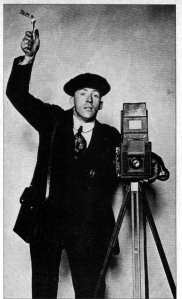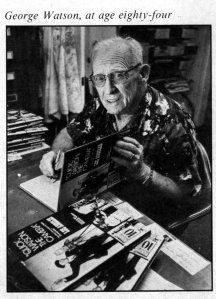When Delmar Watson died in October of last year, he left behind a collection of 20th century news photographs — mostly about people and events in Southern California. He and his five photojournalist brothers made most of the photos, but their uncle, pioneer news photographer George R. Watson contributed thousands of them (see “He Made the News Click” in an earlier posting). The collection grew even larger when other “photogs” donated or willed their collections. Read the rest of this entry »
Posts Tagged ‘Los Angeles’
Delmar Watson’s stories live on.
Posted by donraymedia on June 17, 2009
Posted in Uncategorized | Tagged: L.A. Daily News, L.A. Examiner, L.A. Herald-Express, L.A. Mirror, L.A. Times, Los Angeles, news, newspapers, oral histories, photographers, Santa Anita, Watson | Leave a Comment »
He made the news click
Posted by donraymedia on May 17, 2009
An oral history interview that became a magazine article
(First published in Westways, February, 1977)
By Don Ray
George Watson never anticipated being regarded as a historian. Photography was his career, hobby and best friend. From 1910, when his first news photograph was published, until her retired during World War II, George’s only concern was that of capturing news.

George R. Watson when he shot for the Los Angeles Times.
Although his photographs lost their news value only days after he shot them, their historical value continues to appreciate with each passing generation. The colorful history of twentieth-century Southern California has been preserved in Watson’s collection of news photographs, numbering in the thousands, taken by him and his six nephews, all photojournalists.
Aside from being the dean of Southern California news photographers, the octogenarian’s credits included the invention of the first microfilm machine, the first aerial news photographs of Los Angeles, the first picture ever transmitted over telephone wires and the invention of a prototype of the Pako dryer, a print-drying machine used today in almost every photography lab.
He also founded and was the first president of the Los Angeles Press Photographers Association, an organization that continues to promote respect and dignity among “photogs.”
George Railton Watson befriended photography more than seventy-six years ago when his father, and amateur photographer, bought him a one-dollar Brownie camera for his eighth birthday. The boy developed and printed his first picture, a shot of the Colorado state capitol, and proudly displayed it to the proprietor of the local Eastman Kodak Company agency.
The dealer immediately placed the picture in his shop window above a sign that read, “If an eight-year-old boy can

George Watson shortly before he died in 1977.
take a picture like this, why can’t you?” When the family moved to Los Angeles a year later, the young lensman built his own darkroom out of a dry-goods box, using a coal oil lantern for a red light.
“It’s a wonder I didn’t asphyxiate myself,” George recalls. “I’d come out sweatin’ like the devil, but I’d have my prints.”
After spending most of his teens in the Pacific Northwest, George returned to Los Angeles in 1917. Experience gained taking pictures for the Portland Journals was all he needed to land a job with the Los Angeles Times as their second field photographer. In his twelve years with the Times, he witnessed and photographed nearly every major news story — every disaster, murder, visiting king, queen and president.
He rubbed elbows with the silent-screen stars, sports greats, explorers, adventurers and criminals who made the news.
George learned quickly that working for the press would not always be pleasant. The first time he was assigned to photograph a murder scene he had an experience that nearly sent him looking for another profession. The reporter with whom he worked asked him to get a few shots of a man who was slain by police after he killed his wife. Read the rest of this entry »
Posted in Stories based upon oral history-style interviews | Tagged: 1932 Los Angeles Olympics, Athletes, Disasters, Funerals, Jim Thorpe, Kidnappers, Long Beach earthquake, Los Angeles, Los Angeles Times, Murderers, News photographers, Rudolph Valentino, Southern California, St. Francis Dam disaster | Leave a Comment »
“So I says to Howard Hughes…”
Posted by donraymedia on May 16, 2009
The techno-rebirth of the ancient tradition of story telling.
By Don Ray
(Originally published in Los Angeles Magazine in October, 1982)
Pauline Clark had been waiting, alone and anxious, for this moment. Her new gas stove had just been installed. She reached down for the porcelain-covered handle and gave it a cautious turn to the right. First nothing happened. Then she heard a low rumble that grew louder and louder—as if a freight train were rounding the corner from the living room and heading straight for the kitchen. Things began to shake. Knickknacks and cooking utensils jumped from the wall and crashed down onto the counter. Pauline tried to run but couldn’t. The whole room was shifting back and forth.
It was March 10, 1933. Meanwhile, Pauline’s Husband was trapped in another room. Read the rest of this entry »
Posted in Stories about oral histories | Tagged: Burning libraries, Cal State Long Beach, California State Universitie Fullerton, David L. Clark, Disasters, Dr. Gary Shumway, Howard Hughes, Long Beach, Long Beach earthquake, Los Angeles, Rosie the Riviter, Southern California | Leave a Comment »